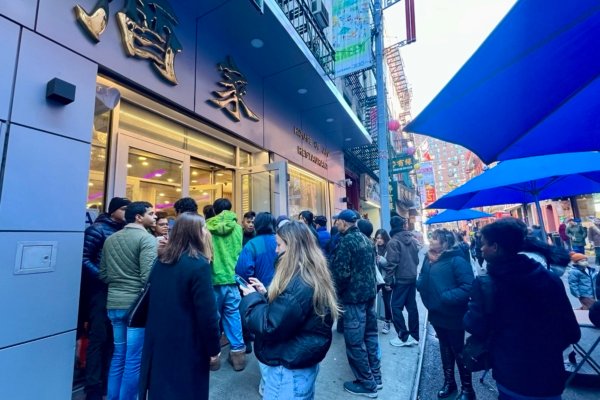Last Saturday, the third day of the Thanksgiving long weekend and the first day outdoor dining plans were suspended during the pandemic, happened to coincide with “Small Business Saturday” in the United States shopping season. Despite the sudden drop in temperature, turning it into the coldest day since winter began, the bustling streets of Manhattan’s Chinatown were filled with vibrant activity. Fruit stalls on the sidewalks were surrounded by customers, keeping the vendors busy; Chinese sellers of counterfeit brand items even mentioned they didn’t have time to eat lunch. Outside many restaurants, customers formed long queues, willing to endure the cold wind for one or two hours to taste long-awaited delicacies.
At the entrance of “Lucky Star Restaurant” on Pell Street, a long line had formed before noon. A pair of brothers from Roosevelt Island in New York City told reporters that despite the one to two-hour wait at this popular restaurant, it was worth it. Mr. Chen, recommended by his sister, came specifically and praised it as “affordable and delicious, not to be missed.” Ms. Wu brought her nephew’s family to taste Cantonese dim sum, appreciating the restaurant for its spacious and family-friendly atmosphere.
Outside “Qing Wei Lanzhou Ramen” on Doyers Street, seats were filled with diners undeterred by the cold. A nearby restaurant that did not offer outdoor dining saw more customers lining up outside due to this limitation.
Inside “Wuchang Delicious Taste” on the same street, customers were welcomed with a comforting hot tea upon being seated. Mr. Wang, the restaurant’s manager, mentioned that the restaurant has been in operation since 1999, boasting over 20 years of service. While outdoor dining was allowed due to the open streets, customers were encouraged to dine indoors on cold days. The attraction to the place lay in its collection of Taiwanese night market snacks and distinctive regional dishes from various parts of Southern China. The menu offered affordable prices, attracting a diverse clientele of both Eastern and Western faces.
Last week, New York City transitioned from temporary outdoor dining facilities during the pandemic to a long-term outdoor dining plan requiring permits, increasing costs and restrictions for businesses. Some establishments, experiencing improved business, chose to abandon outdoor dining setups.
The outdoor dining facilities at “Silver Memories Cheong Fun Shop” located at the intersection of Bayard Street and Mulberry Street have been removed, making the nearby streets relatively spacious again. Busy attending to cash registers, packing takeout orders, and coordinating services inside, Mr. Liu, the owner, mentioned that the restaurant’s business was booming, hence it no longer needed outdoor dining to attract customers.
Similarly situated on Bayard Street, “Friends Snack Shop” was renowned for its paper-wrapped sponge cakes. The staff mentioned that while they previously had outdoor dining, they now needed to apply for new permits. Having to dismantle the pavement in front of their shop four times a year for this purpose not only proved to be cumbersome but also increased costs. Fortunately, with stabilizing business, the need for outdoor dining was almost entirely eliminated.

